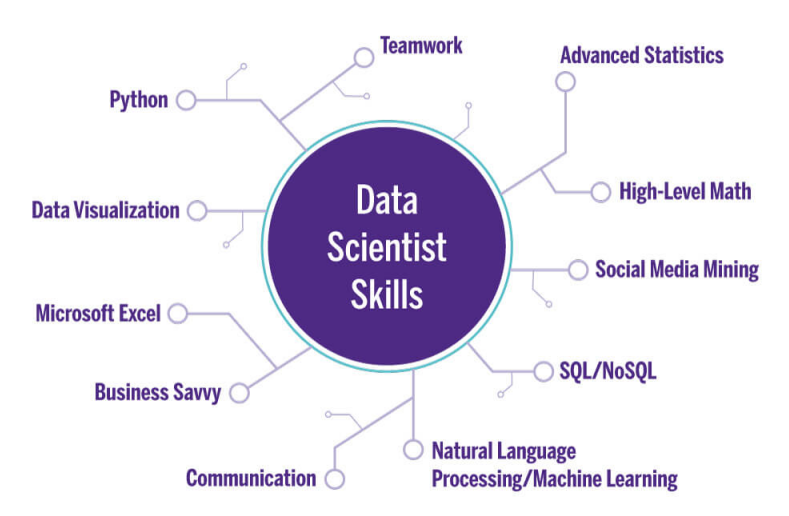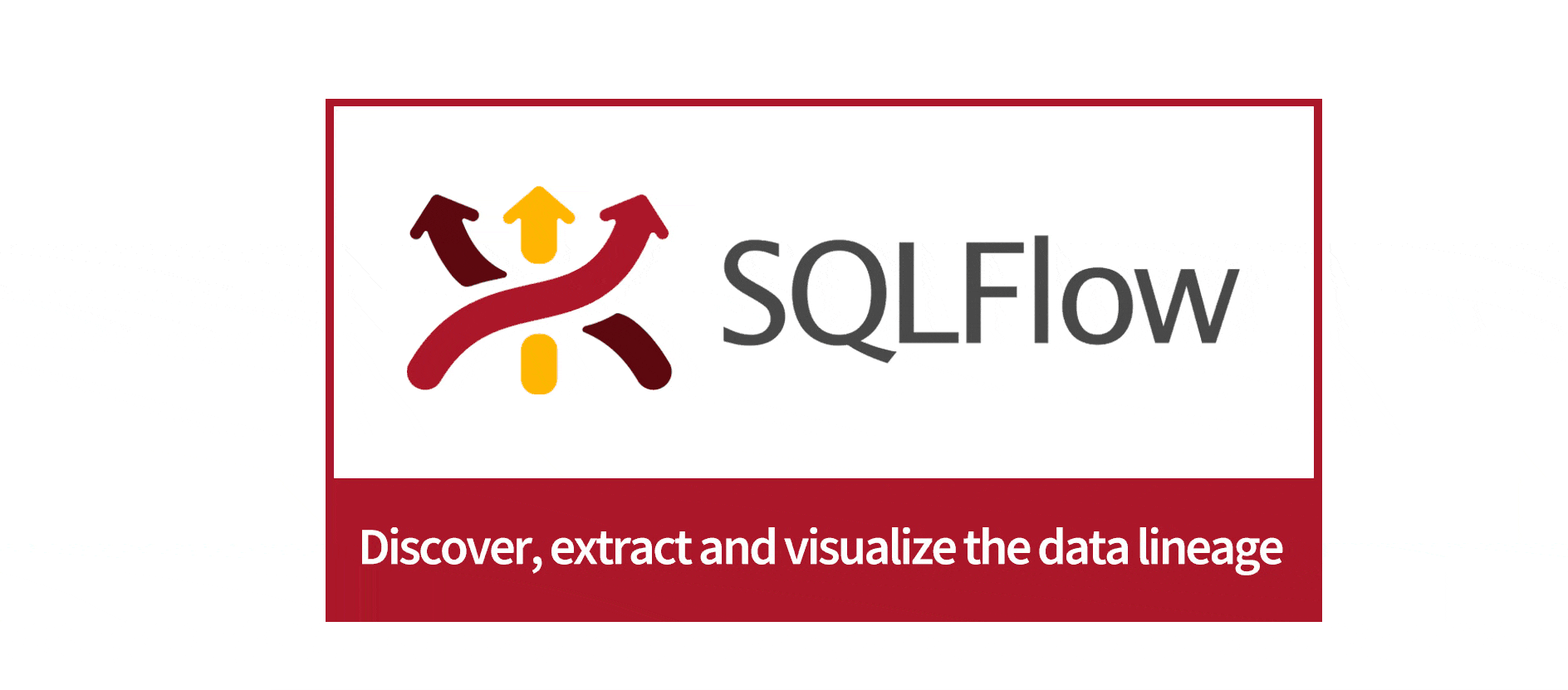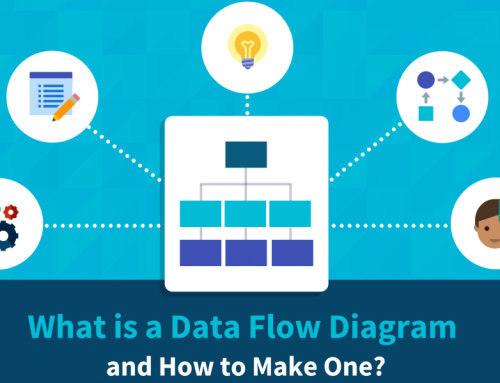Top 10 Data Scientist Skills You Need in 2022
The field of data science is evolving rapidly. Only by mastering the basics of data science can you move on to more advanced concepts like deep learning and artificial intelligence. Data science covers a wide range of fields, including data preparation and exploration, data representation and transformation, data visualization and expression, predictive analysis, and machine learning. Hearing this, it is natural for beginners to wonder: what skills are necessary for a data scientist? To that end, this article explores 10 important data scientist skills.

Data Scientist Skills
Top 10 Data Scientist Skills – 1. Mathematics and Statistics
1. Statistics and Probability: Statistics and probability are mainly used in the fields of feature visualization, data preprocessing, feature transformation, data reconstruction, data dimension reduction, feature engineering and model evaluation. Before you begin, you need to be familiar with the following concepts:
a) Average
b) Median
c) Mode
d) Standard deviation
e) Correlation coefficient and covariance matrix
f) Probability distribution (binomial distribution, Poisson distribution, normal distribution)
g) P value
h) Mean squared error
i) Determination coefficient R2
j) Bayes’ Theorem (Precision, Recall, Positive Predictive Value, Negative Predictive Value, Confusion Matrix, ROC Curve)
k) A/B testing
l) Monte Carlo simulation
2. Multivariate Calculus: Most machine learning models are created based on a dataset, which often contains multiple feature values or predictor variables. Therefore, before creating a machine learning model, you must know enough about multivariate calculus. Therefore, you should be familiar with the following concepts:
a) Multivariate functions
b) Derivatives and Slopes
c) Step function, sigmoid function, utility function, linear rectification function
d) cost function
e) function plot
f) function maximum and minimum
3. Linear Algebra: Linear algebra is the most important mathematical skill in the field of machine learning. Data sets can be represented by matrices. Linear algebra is used in data preprocessing, data transformation, and model evaluation. Therefore, the concepts to understand are as follows:
a) Vector
b) Matrix
c) Transpose of the matrix
d) Inverse matrix
e) The determinant of the matrix
f) Dot Product
g) Eigenvalues
h) Eigenvectors
4. Optimization Method: Most machine learning algorithms run the predictive model by minimizing the processing objective function and then obtaining the weights for the test data to obtain the predicted labels. To do this, you need to be familiar with the following concepts:
a) cost function/objective function
b) Likelihood function
c) Error function
d) Gradient descent algorithm and its variants (stochastic gradient descent algorithm)
Top 10 Data Scientist Skills – 2. Programming
In the field of data science, programming is a very important skill. Among them, the two most commonly used programming languages are Python language and R language, so it is necessary to understand them. However, some organizations may not require people to master both Python and R, just be proficient in either.
1. Python Programming Language: You should be proficient in basic Python programming skills. To this end, the following lists several of the most important Python installation packages, which should be understood and used proficiently.
a) Numpy
b) Pandas
c) Matplotlib
d) Seaborn
e) Scikit-learn
f) PyTorch
2. R Programming Language:
a) Tidyverse
b) Dplyr
c) Ggplot2
d) Caret
e) Stringr
3. Other Programming Languages: In today’s society, some industry organizations may also require some other programming languages, such as:
a) Excel
b) Tableau
c) Hadoop
d) SQL
e) Spark
Top 10 Data Scientist Skills – 3. Data Integration and Preprocessing
In the field of data science, whether it is inference analysis, predictive analysis, or prescriptive analysis, any analysis process requires the participation of data. Whether a prediction model can make accurate predictions depends mainly on the quality of the data used in the modeling process. Data comes in a variety of forms, such as text, tables, images, voice, and video. Often, data for analysis needs to be mined, processed, and transformed into a suitable form for subsequent analysis.
1. Data Integration: Data integration is a very important step for every data scientist. In a data science project, most of the data cannot be used directly for analysis because they usually exist in files, databases or various documents such as web pages, tweets or PDF documents. Therefore, it is imperative to learn how to integrate and clean the data in order to derive great insights from it.
2. Data Preprocessing:It is also crucial to understand data preprocessing, and the main concepts related to it are as follows:
a) Handling missing data
b) Data reconstruction
c) Processing categorical data
d) Encoding class labels when dealing with classification problems
e) Various feature transformation techniques and dimensionality reduction methods, such as principal component analysis (PCA), linear discriminant analysis (LDA)
Top 10 Data Scientist Skills – 4. Data Visualization
A qualified data visualization should have the following:
a) Data type: When deciding how to visualize data, it is important to know the type of data, such as whether it is categorical data, discrete data, continuous data, temporal data, or some other kind.
b) Geometric graph: Appropriate visualization methods should be selected according to the data type, including scatter plot, curve graph, bar graph, histogram, QQplot, density map, box graph, pairplot multivariate graph, and heat map, etc.
c) Mapping: Variables on the X-axis and Y-axis need to be selected respectively. This step is especially important if the data to be analyzed is a cube with multiple eigenvalues.
d) Scale: You need to choose which scale to use, such as linear or logarithmic scale.
e) Label: The labels used at this time mainly include coordinate axes, title, legend, size and so on.
f) Ethics: You must ensure that the visualization method can illustrate the facts. In the process of cleaning and summarizing the data, and finally visualization, we must pay attention to every step of our operation, so as to ensure that the final results are true and reliable and will not mislead the readers.
Top 10 Data Scientist Skills – 5. Basic Machine Learning Skills
Machine learning is an important branch of data science, so it is also crucial to understand machine learning frameworks, such as problem framing, data analysis, modeling, evaluation, and model application. Below is a list of some important machine learning algorithms that should be studied.
1. Supervised Learning (Continuous Variable Prediction)
a) Basic regression analysis
b) Multidimensional regression analysis
c) Regularized regression
2. Supervised Learning (Discrete Variable Prediction)
a) Logistic regression classifier
b) Support vector machine classifier
c) K-nearest neighbor algorithm classifier
d) Decision tree classifier
e) Random forest classifier
3. Unsupervised Learning
a) K-means clustering algorithm
Top 10 Data Scientist Skills – 6. Data Science Project Practical Skills
If you want to become a data scientist, knowledge from books is not enough. A qualified data scientist must be able to perform in the real world and successfully complete a data science project. This process involves various stages in data science and machine learning, such as problem framing, data collection and analysis, and model building, evaluation, and installation. If you want to get the data science practice project, you can do it in the following ways:
A) Kaggle project in action
B) Corporate internship
C) Corporate interview
Top 10 Data Scientist Skills – 7. Communication Skills
A qualified data scientist needs to be able to communicate his ideas with team members or organizational leaders. Therefore, if a data scientist has excellent communication skills, he will be able to convey all kinds of very professional information clearly to others, even a layman with no background in data science. In addition, good communication skills can also create an atmosphere of solidarity and collaboration between data scientists and other team members (such as data analysts, data engineers, field engineers, etc.).
Top 10 Data Scientist Skills – 8. Life-long Learning
The field of data science is constantly changing and developing, so people should also be prepared to embrace and learn about emerging technologies. One of the ways to keep up with developments in the field of data science is to engage with other data scientists. So in order to expand your social circle, there are many platforms to choose from, such as LinkedIn, GitHub repositories, and the Medium website (which has Towards Data Science and Towards AI columns). These platforms are very useful and provide information on the latest developments in the field of data science.
Top 10 Data Scientist Skills – 9. Teamwork
In the actual work process, data scientists will work in teams with other members, which may include data analysts, engineers, and various managers. Therefore, data scientists not only need to have good communication skills, but also need to listen carefully to the ideas of other members, especially in the early stages of project development. Because at this stage, data scientists need to rely on engineers or other professionals to design a quality data science project. In addition, excellent teamwork skills can help people shine in the workplace and develop good interpersonal relationships with other team members, managers, or organizational leaders.
Top 10 Data Scientist Skills – 10. Ethics in Data Science
The possible social impact of the project must be understood. Be realistic. Never manipulate data or use methods that are prone to bias. From data collection to data analysis, from model building to model analysis and evaluation, basic ethics must be observed at every stage. Never attempt to mislead or manipulate readers by falsifying results. It is important to maintain an ethical line when presenting research findings.
Conclusion
In short, this article discusses ten must-have data scientist skills. The development of the field of data science is changing rapidly. Only by mastering the basic knowledge of the field can people continue to explore more advanced theories, such as deep learning, artificial intelligence, etc.
If you want to learn more about data scientists, we would like to advise you to visit Gudu SQLFlow for more information. As one of the best data lineage tools available on the market of 2022, Gudu SQLFlow can not only analyze SQL script files, obtain data lineage, and perform visual display, but also allow users to provide data lineage in CSV format and perform visual display. (Published by Ryan on Aug 6, 2022)
If you enjoy reading this, then, please explore our other articles below:



